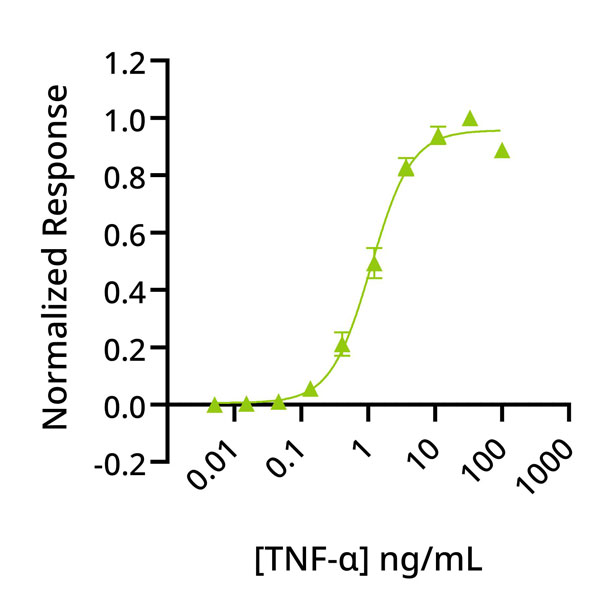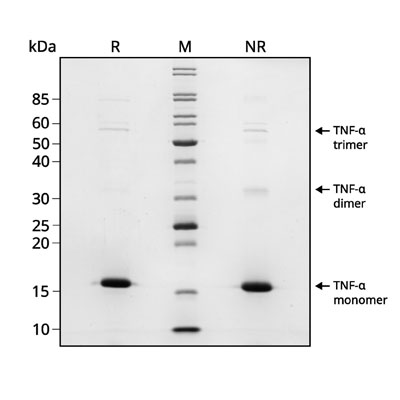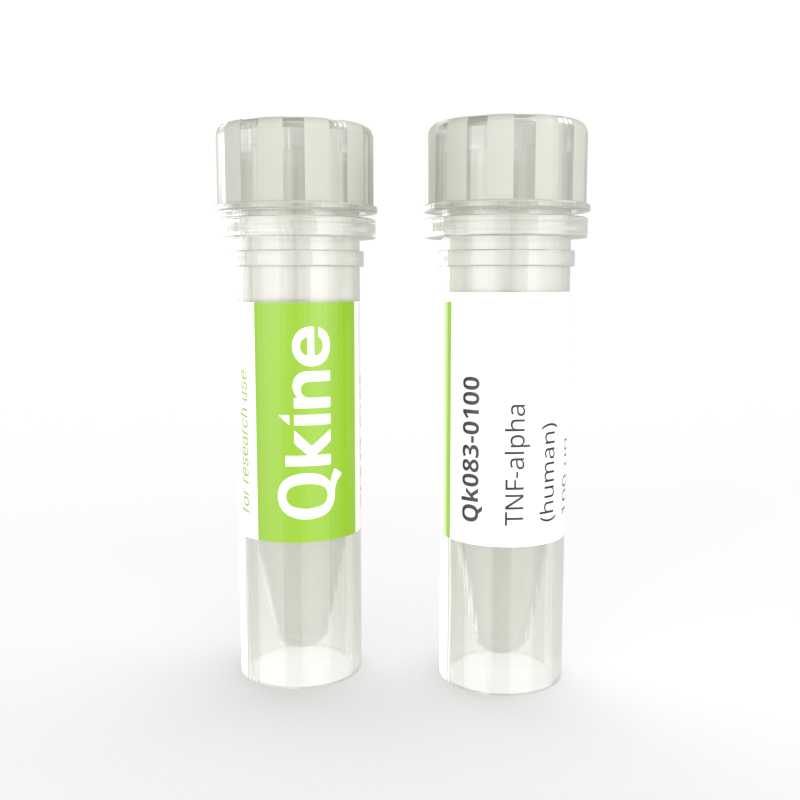Currency
Recombinant human TNF-alpha protein (Qk083)
Tumor necrosis factor-alpha (TNF-α) is a cytokine involved in cell signaling, primarily produced by immune cells like macrophages. It plays a central role in inflammation, immunity, and regulating cell survival and death.
Human TNF-α has a molecular weight of 17.3 kDa, animal origin-free, carrier-free and protein tag-free to ensure its purity with exceptional lot-to-lot consistency. Qk083 TNF-alpha is suitable for the culture of reproducible and high-quality hematopoietic stem cells and other relevant cells.
Orders are typically shipped same or next day (except Friday).
Easy world-wide ordering, direct or through our distributors.
1000µg will be despatched as 2 x 500µg
Fast and free shipping.
Buy online with secure credit card or purchase order.
For any questions, please email orders@qkine.com
Summary
High purity human protein (Uniprot number: P01375)
>98%, by SDS-PAGE quantitative densitometry
Source: Expressed in E. coli
17.3 kDa (Non covalent trimer)
Animal origin-free (AOF) and carrier protein-free
Manufactured in Cambridge, UK
Lyophilized from Tris/NaCl
Resuspend in water at >100 µg/mL, prepare single-use aliquots, add carrier protein if desired, and store frozen at -20oC or -80oC
Featured applications
Inflammation regulation
Immune response modulation
Cell survival regulation
Apoptosis regulation
Metabolic function regulation
Autoimmune disease and inflammatory disorders
TNF-alpha
Tumor necrosis factor ligand superfamily member 2
Cachectin
Human
Frequently used together
Recombinant human IL-1 beta protein (Qk101)
Recombinant human IL-6 protein (Qk093)
Recombinant human IL-4 protein (Qk092)
Recombinant human IL-3 protein (Qk090)
Recombinant IFN-gamma protein – coming soon
Bioactivity

TNF-α activity is determined using the TNF-α-responsive firefly luciferase reporter assay. Transfected HEK293T cells are treated in triplicate with a serial dilution of TNF-α for 3 hours. Firefly luciferase activity is measured and normalised to the control Renilla luciferase activity. Data from Qk083 lot #204609. EC50 = 1.1 ng/mL (63 pM).
Purity

Recombinant TNF-α migrates as a major band at approximately 17 kDa (monomer) in reduced (R) and non-reduced (NR) conditions. The dimeric and trimeric forms are also observed at approximately 33 and 55 kDa, respectively. No contaminating protein bands are present.The purified recombinant protein (3 µg) was resolved using 15% w/v SDS-PAGE in reduced (+β-mercaptoethanol, R) and non-reduced (NR) conditions and stained with Coomassie Brilliant Blue R250. Data from Qk083 lot #204609.
Further quality assays
Mass spectrometry, single species with the expected mass
Endotoxin: <0.005 EU/μg protein (below the level of detection)
Recovery from stock vial: >95%
We are a company founded and run by scientists to provide a service and support innovation in stem cell biology and regenerative medicine. All our products are exceptionally high purity, with complete characterisation and bioactivity analysis on every lot.
Protein background
Tumor necrosis factor-alpha (TNF-alpha) is a multifunctional cytokine that plays a central role in inflammation, immunity, and various physiological processes [1]. It is primarily produced by activated macrophages and other immune cells, although it can also be synthesized by a variety of other cell types, including endothelial cells, fibroblasts, and adipocytes [2,3].
TNF-alpha exerts its effects by binding to two distinct receptors: TNF receptor 1 (TNFR1) and TNF receptor 2 (TNFR2). Both receptors are widely expressed on many cell types throughout the body [4]. TNFR1 activation triggers pro-inflammatory responses, apoptosis, and immune cell recruitment, while TNFR2 signaling is involved in tissue regeneration, immune regulation, and cell survival [5,7].
One of the primary functions of TNF-alpha is its role in the initiation and regulation of inflammation. Upon activation, TNF-alpha stimulates the production of other pro-inflammatory cytokines, such as interleukin-1 (IL-1) and interleukin-6 (IL-6), as well as chemokines that attract immune cells to sites of infection or injury [6]. This pro-inflammatory cascade helps to eliminate pathogens and promote tissue repair. However, dysregulated TNF-alpha signaling can lead to chronic inflammation and tissue damage, contributing to the pathogenesis of various autoimmune diseases, such as rheumatoid arthritis, inflammatory bowel disease, and psoriasis.
TNF-alpha plays a crucial role in the regulation of immune responses. It modulates the activation, proliferation, and differentiation of immune cells, including T cells, B cells, and natural killer (NK) cells. TNF-alpha is also involved in the regulation of adaptive immunity by influencing antigen presentation and T cell activation [1-3,8,9].
TNF-alpha has diverse effects on various physiological processes, including metabolism, angiogenesis, and tissue remodeling. It is implicated in the pathogenesis of obesity, insulin resistance, and cardiovascular diseases. TNF-alpha contributes to the host defence against tumors by promoting inflammation and activating immune responses against cancer cells [10]. TNF-alpha has emerged as an important therapeutic target in the treatment of inflammatory and autoimmune diseases. Biologic agents that inhibit TNF-alpha, such as monoclonal antibodies and soluble receptors, have revolutionized the management of conditions like rheumatoid arthritis, Crohn’s disease, and psoriasis, providing relief for patients who do not respond to conventional therapies. However, the blockade of TNF-alpha can also lead to adverse effects, including increased susceptibility to infections and the development of paradoxical inflammatory reactions [11,12].
Our products are for research use only and not for diagnostic or therapeutic use. Products are not for resale.



What others are saying
There are no contributions yet.